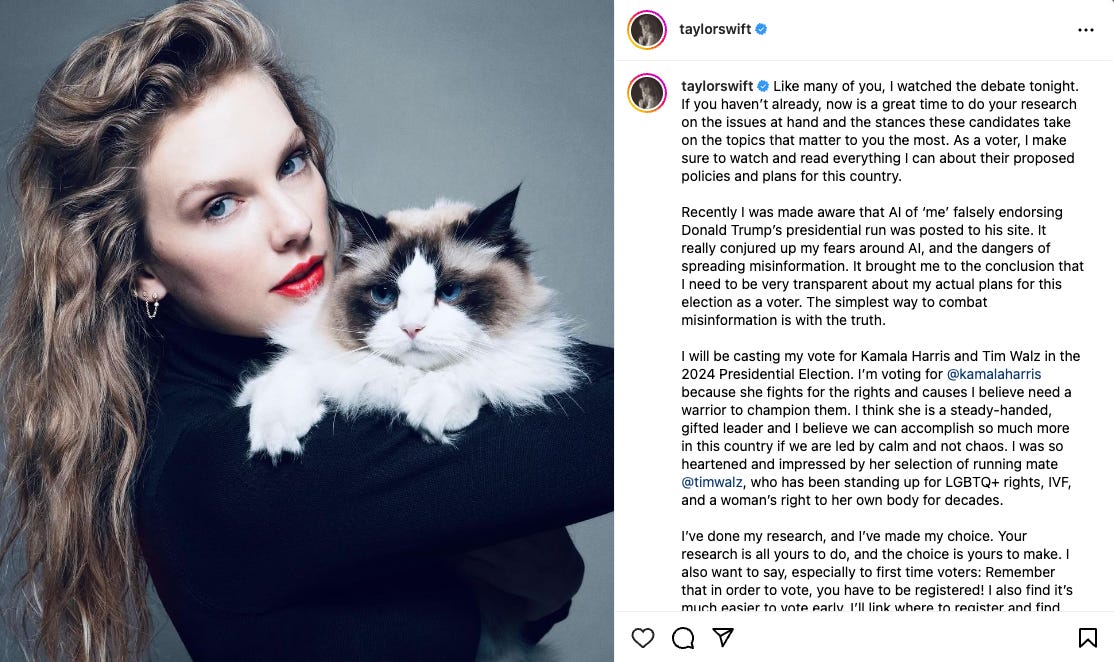How Taylor Swift’s endorsement of Harris and Walz is a masterpiece of persuasive prose
A songwriter's practical lesson in written advocacy
Taylor Swift has endorsed the Democratic nominees Kamala Harris and Tim Walz.
*
Politically and culturally the endorsement is significant, but this is not really a political or cultural blog.
This is, however, a blog that sometimes provides close readings of key documents, and there are things about the endorsement that are perhaps worth noticing and remarking upon.
In essence: this endorsement is a masterpiece of practical written advocacy, and many law schools would do well to put it before their students.
*
Look carefully at the first three paragraphs - especially the use of the first person “I” and “me/my” and the second person “you” (emphasis added):
“Like many of you, I watched the debate tonight. If you haven’t already, now is a great time to do your research on the issues at hand and the stances these candidates take on the topics that matter to you the most. As a voter, I make sure to watch and read everything I can about their proposed policies and plans for this country.
“Recently I was made aware that AI of ‘me’ falsely endorsing Donald Trump’s presidential run was posted to his site. It really conjured up my fears around AI, and the dangers of spreading misinformation. It brought me to the conclusion that I need to be very transparent about my actual plans for this election as a voter. The simplest way to combat misinformation is with the truth.
“I will be casting my vote for Kamala Harris and Tim Walz in the 2024 Presidential Election. I’m voting for @kamalaharris because she fights for the rights and causes I believe need a warrior to champion them. I think she is a steady-handed, gifted leader and I believe we can accomplish so much more in this country if we are led by calm and not chaos. I was so heartened and impressed by her selection of running mate @timwalz, who has been standing up for LGBTQ+ rights, IVF, and a woman’s right to her own body for decades.”
*
In the first paragraph, she ensures that she identifies with you the reader - “Like many of you [comma]” and “As a voter [comma]”.
There are four “yous” in that first paragraph: you, you, you, you.
You are already half-nodding along. You and Swift have common ground.
*
In the second paragraph, she then describes things of personal concern - but here she avoids putting “I” at the start of any sentence. This makes it look that she is describing the situation objectively.
She deftly - and convincingly - justifies making a political endorsement. The sentences “It brought me to the conclusion that I need to be very transparent about my actual plans for this election as a voter. The simplest way to combat misinformation is with the truth.” are perfectly reasonable.
Two premises leading to a “conclusion”, and in just one paragraph.
*
You will see that so far she has avoided starting any sentence with “I”.
And then, with the third paragraph, wham.
The first sentence beginning with “I” is the actual endorsement.
And then every sentence in the third paragraph begins with “I”: bam bam bam.
*
Also, like any good advocate, Swift is careful to make the listener or reader feel that it is their own decision to make, and again this is skilfully done:
“I’ve done my research, and I’ve made my choice. Your research is all yours to do, and the choice is yours to make.”
Note the rhythm: I, I, you, you, you.
The most effective persuasion is often to lead the listener or reader to making their own decision - and to make them feel they are making their own decision.
*
Finally, the pay-off: the thing that will linger.
The reader is already half-aware of what is coming, because of the photograph.
A good pay-off is often a call-back - and here, cleverly, the call-back is to the visual clue the reader would have registered before even reading.
“With love and hope,
Taylor Swift
Childless Cat Lady”
This is, of course, a swipe and a blow against J. D. Vance, the Republican vice presidential nominee.
And so Swift mocks the Lilliputian.




I also like the measured praise "I think she is a steady-handed, gifted leader and I believe we can accomplish so much more in this country if we are led by calm and not chaos."
If you're trying to persuade the undecided, sycophancy is probably not going to work.
Your analysis is equally ‘masterful’